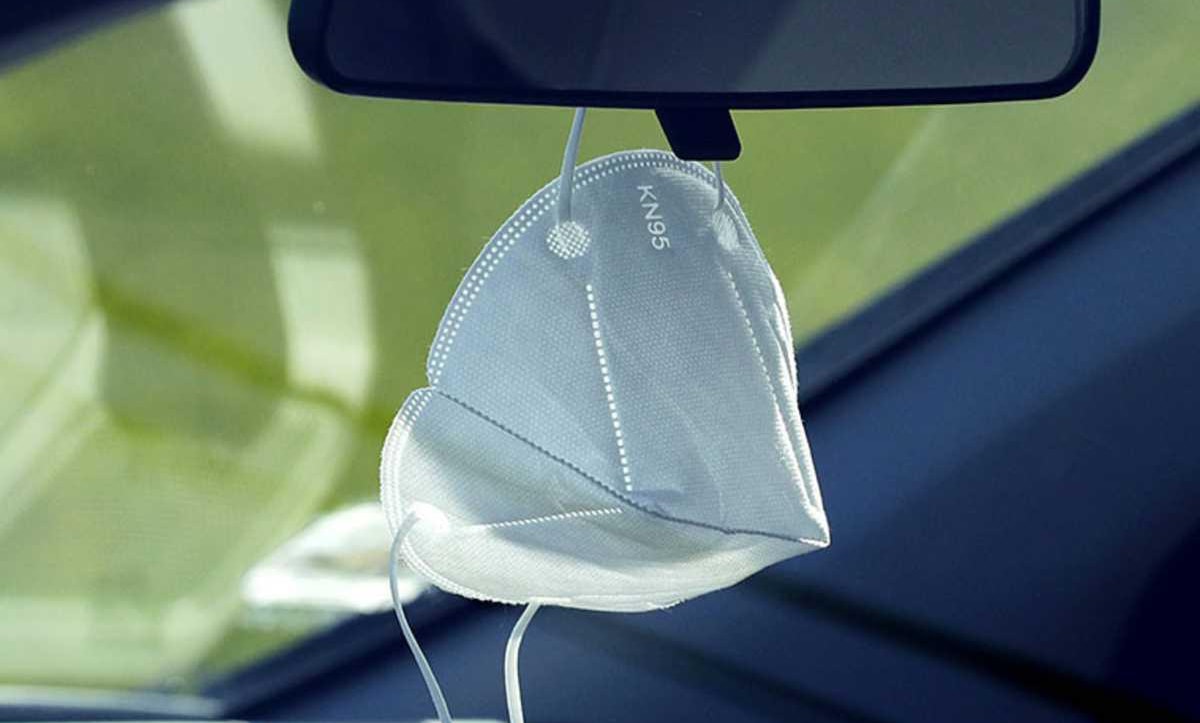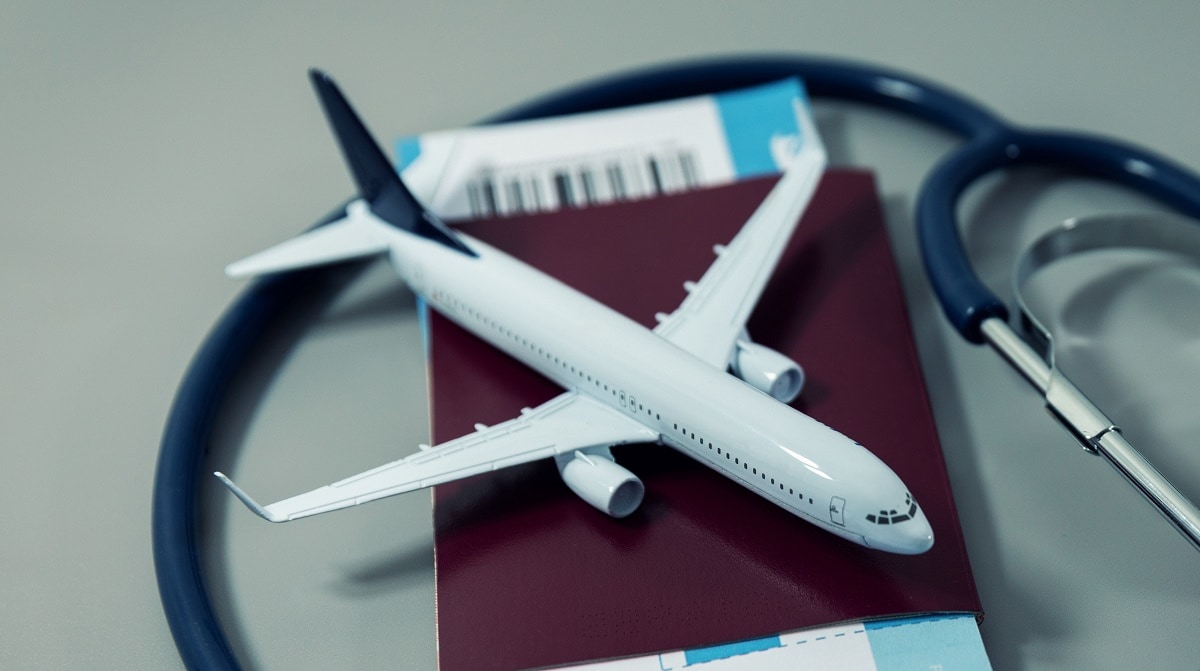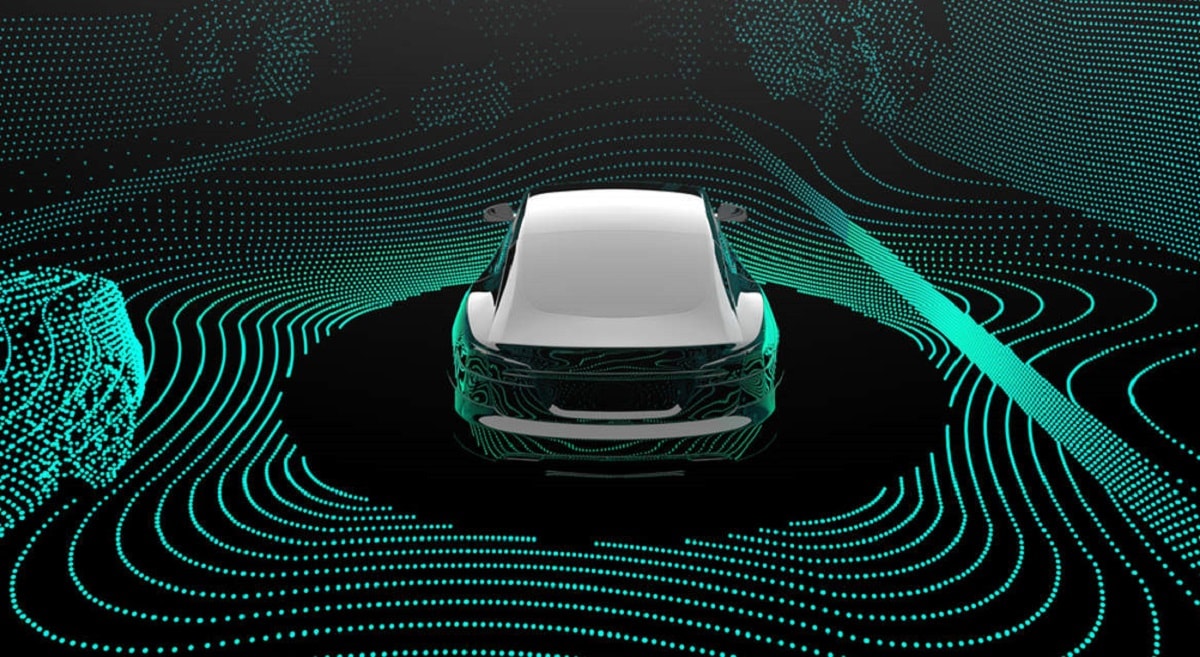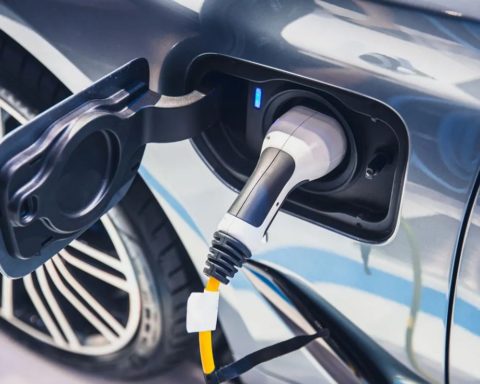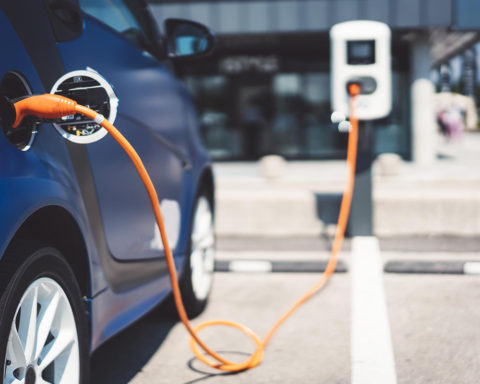« Les Français pourront partir en vacances en France en juillet et août » : c’est officiel, Edouard Philippe vient de l’annoncer ce jeudi 14 mai. Le déconfinement semble sur la bonne voie. Même si dans la foulée la ministre de la Transition écologique, Elisabeth Borne, a annoncé la création d’une filière de formation de 250 mécaniciens vélo pour remettre sur pied la petite reine (1), le problème de la mobilité par temps de déconfinement reste encore entier. C’est notamment l’Institut Vedecom qui va s’y coller : Comment concilier la gestion de cette crise sanitaire avec les trajets quotidiens de millions de personnes pour les transports en commun et les transports individuels ?
Le déconfinement semble marquer le début du retour à la normale. Mais il ne signifie pas pour autant la fin des mesures pour se protéger et protéger les autres. Dans cette perspective, il y a une préoccupation majeure sur la question du transport pour les Français avec le gouvernement qui tend d’un côté à renforcer l’offre des transports urbains, tout en faisant baisser la demande.
On sait que depuis le 17 mars, premier jour de confinement, la mobilité de la population française a été réduite de 65 %, faisant chuter de 60 millions à 20 millions les déplacements par jour, et avec des disparités entre les treize régions métropolitaines. En effet, selon une modélisation des chercheurs de l’Institut Pierre-Louis d’épidémiologie et de santé publique (Iplesp, Inserm, Sorbonne Université) parue le 11 mai, la diminution des déplacements a été plus marquée là où l’épidémie était la plus forte.
Par ailleurs, de plus en plus de preuves tendent à prouver le rôle majeur des transports en commun dans la propagation du virus, les auteurs de l’étude insistant sur le rôle accru des restrictions à la mobilité dans la lutte contre l’épidémie. Les vacances seront donc les bienvenues ; encore faut-il anticiper et gérer l’organisation de la mobilité sur tout le territoire.
L’Institut pour la Transition Energétique (ITE) Vedecom est une fondation partenariale publique-privée fondée sur une collaboration inédite entre 58 acteurs engagés dans les mobilités innovantes et durables, c’est-à-dire plus écologiques, plus autonomes et mieux partagées. Elle vient d’être missionnée par l’État pour faire collaborer l’écosystème des mobilités et développer une nouvelle filière française des mobilités durables, c’est-à-dire électriques, autonomes et partagées. A ce titre, elle lance une importante étude sur le comportement et les attentes des Français et préconise quelques solutions à mettre en œuvre.
La Covid-19 et la mobilité : Donner aux acteurs de la mobilité, une nouvelle clé d’analyse
L’épidémie de Covid-19 et l’épisode inédit de confinement qu’elle a provoqué ont bouleversé en profondeur, et sans doute pour longtemps, notre rapport à la mobilité. Preuve en est le retour en force du vélo en ville ! Mais qu’en est-il pour les territoires ruraux ? Alors que nous sommes au quatrième jour de déconfinement, la question des modalités de nos déplacements du quotidien devient plus que jamais cruciale. Pour comprendre et appréhender les effets de la crise sur les moyens de transports au quotidien, pour analyser le comportement et les attentes des Français afin de proposer des solutions pouvant être mises en place rapidement ou à plus long terme, l’Institut pour la Transition Énergétique lance une grande consultation nationale en ligne intitulée « Le COVID-19 et la mobilité ».
La consultation est ouverte jusqu’au 25 mai et s’adresse à tous les citoyens français et aux experts de la mobilité (Les réponses à ce questionnaire sont strictement anonymes et confidentielles).
Déconfinement et transport : quelles solutions ?
Dans quelles conditions vont s’effectuer les déplacements ? Selon Pierre Serne, ancien vice- président de la région chargé des transports, administrateur d’Ile-de-France Mobilités et président du Club des villes et territoires cyclables (EELV) dans un entretien au Parisien, « Tout le monde s’accorde à dire qu’après l’épidémie il y aura un rejet collectif des transports en commun. Si on ne veut pas prendre le métro, le bus ou le car pour se rendre au travail par crainte de la contagion, il faudra bien qu’on puisse se déplacer. » Il faudra bien trouver des alternatives fiables.
L’institut Vedecom préconise quelques solutions à mettre en oeuvre :
- Prédire et optimiser les flux de mobilité pour décongestionner les transports en commun et la route en fonction du motif et du moyen de déplacement du point A au point B.
- Estimer en temps réel ou de façon prédictive le nombre d’usagers aux points principaux pour mettre en place une offre de transport adaptée et organiser ces dispositifs transitoires que sont par exemple les pistes cyclables temporaires. Exemple : déclaration anonyme et anticipée sur une application mobile de transports.
- Développer et promouvoir des solutions de mobilité douce avec la notification de l’aménagement urbain et de la voirie, comme l’élargissement des voies pour les vélos et pour les piétons.
- Encourager une mobilité rationalisée et frugale : télétravail, visioconférence, incitation aux transports bas carbone, …
- Faciliter le déploiement d’une « réserve robotique mobile » pour assister l’homme (Ex : robots livreurs pour la logistique du dernier kilomètre) ou limiter l’exposition de chauffeurs (Ex : métros et navettes autonomes).
- Penser une mobilité au service des immobiles, en apportant des services aux utilisateurs (Ex : cabinets de diagnostics mobiles, véhicules qui apportent le réseau internet dans les quartiers peu équipés, banques mobiles, bureaux mobiles).
78 % des conducteurs pensent que « les transports en commun constitueront toujours un risque de contamination, même après la période de confinement » selon un sondage effectué par la ligue de défense des conducteurs auprès de 1 200 personnes. Un autre sondage réalisé par le cabinet d’études Boston Consulting Group (BCG) auprès de 5 000 personnes en Europe dont 500 Français confirme aussi cette appréhension. Ainsi, 20 % d’entre elles ont déclaré une utilisation moins fréquente des transports en commun.
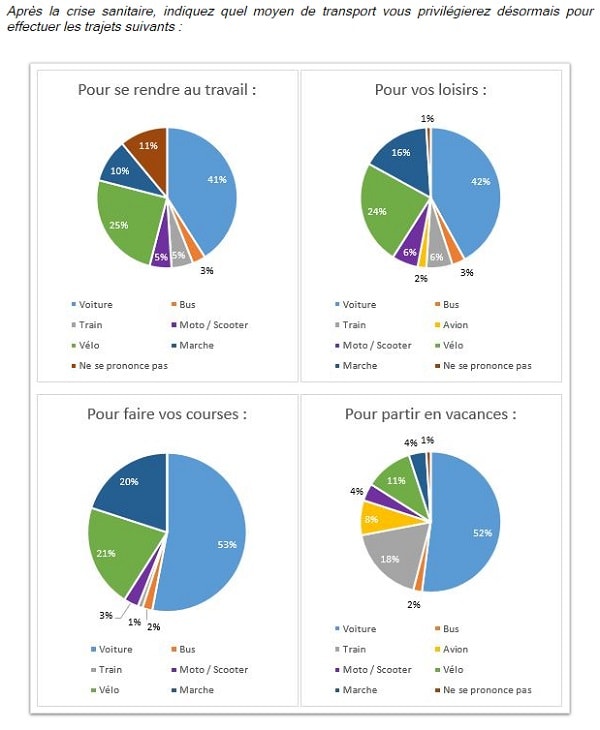
Source : Sondage Ligue de défense des conducteurs
De nombreuses questions restent donc en suspens. Si l’Etat aide bien les entreprises en difficulté et fait redémarrer la filière vélo, saura-t-il soutenir les particuliers, amenés à se déplacer en automobile ? Les personnes sondées partagent cette question puisqu’ils sont 68 % à penser que les politiques actuelles en matière d’automobile (taxation, répression…) sont inadaptées à la reprise de la vie après le confinement.
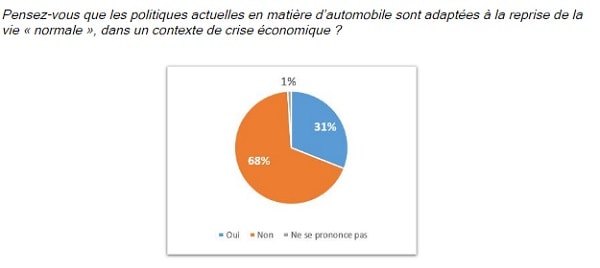
Source : Sondage Ligue de défense des conducteurs
Ce graphique montre qu’il paraît impossible de bâtir le monde « d’après » sans l’automobile. À l’heure de la réflexion sur notre mobilité, la voiture se montre rassurante, sûre, vectrice de désenclavement et présente sur l’ensemble du territoire. Elle s’impose, une fois de plus, comme la partenaire indispensable de la reprise de la vie « normale », l’outil incontournable pour nos contacts sociaux et économiques à venir.
Reste à s’intéresser de près aux innovations en matière de nouvelles mobilités, à moteur électrique ou hydrogène, et en suivant notamment la Finale du Movin’On Startup Challenge qui se tiendra cette année exceptionnellement sous forme d’un événement digital interactif le jeudi 4 juin : dix startups ont été sélectionnées et sont invitées à « pitcher » en direct devant un jury composé de professionnels experts sur les diverses catégories du challenge que sont préserver les ressources, mobilité plus sure et accessible, etc. Car comme l’explique Florent Menegaux, Président de Movin’On, « La crise que nous traversons ne doit pas donner un coup d’arrêt à nos actions, bien au contraire. Il s’agit d’une opportunité sans précédent pour accentuer le virage attendu vers une mobilité plus durable. Une initiative qui s’inscrit pleinement dans une dynamique de soutien aux jeunes pousses, aptes à proposer de nouveaux modèles de mobilité durable, de nouveaux modèles d’affaires et des opportunités de faire autrement ».

(1) Quelque 250 mécaniciens vélos seront formés dans les prochains mois pour répondre à la demande de réparation, avec également la création d’une Académie des métiers du vélo. Cette Académie, dotée de huit millions d’euros pour la période 2020-2022, permettra de « développer des guides techniques, une plateforme web et des supports de formation, mais aussi de former des experts du vélo de tous les niveaux (mécaniciens, formateurs…) », …
Pour aller plus loin :
- Découvrez les nouveaux aménagements provisoires de mobilité à Paris
- L’initiative Zenpark, propulsée par EDF Pulse Croissance, pour réserver votre parking partagé dans toute la France

